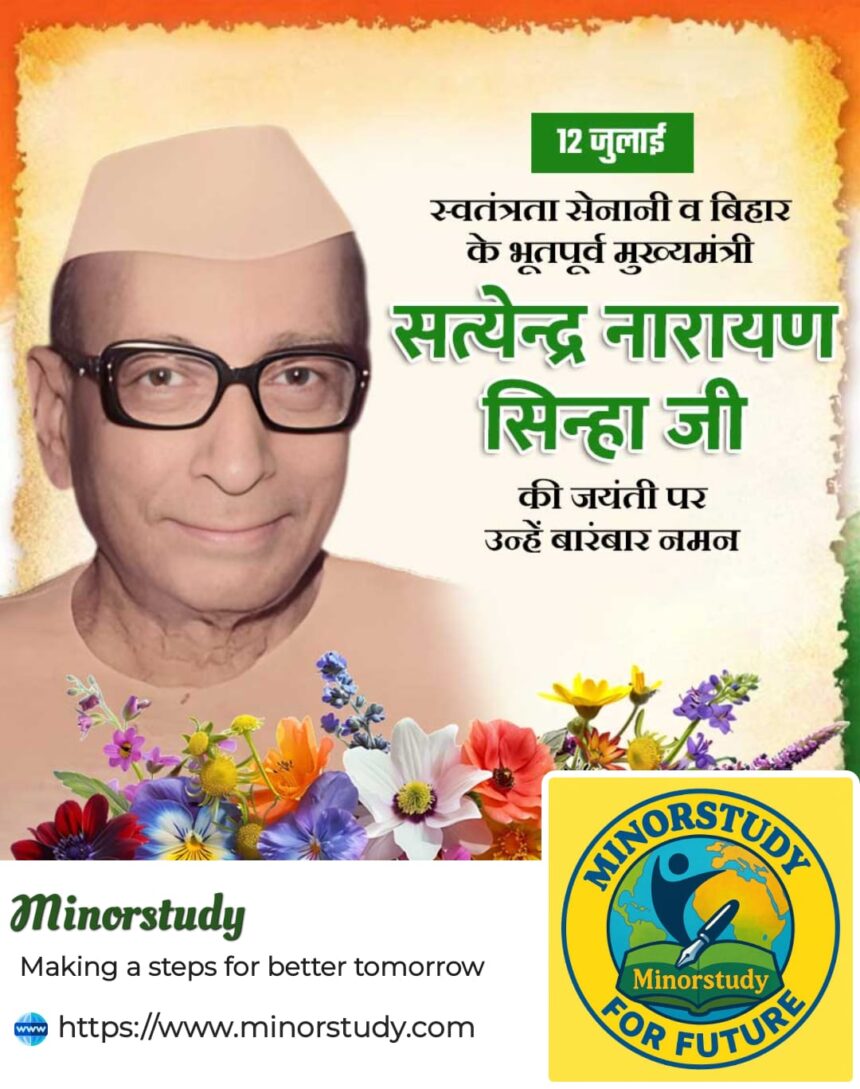🕊️ 10 Powerful Reasons Why Satyendra Narayan Sinha Legacy Still Inspires India Today
🌟 Introduction: A Leader Beyond His Time
Satyendra Narayan Sinha, often affectionately known as Chhote Saheb, was more than a politician—he was a statesman, visionary, freedom fighter, and a committed education reformer. His towering presence in Bihar’s political landscape and deep involvement in national affairs made him a key figure in shaping modern India. Born in an era of colonial rule and shaped by the values of the freedom struggle, Sinha Ji left behind a legacy of integrity, development, and public service that continues to resonate.
- 🌟 Introduction: A Leader Beyond His Time
- 📜 History of Satyendra Narayan Sinha
- 🏛️ Key Facts and Contributions
- 🧭 Timeline of His Life and Achievements
- 💡 Significance of Satyendra Narayan Sinha in Indian Political History
- 🎯 Importance in Our Life and Society
- ❓ Frequently Asked Questions (FAQs)
- 🎉 Wishing on His Birth Anniversary
- 🔑 Important Points to Remember
- 🧠 Conclusion: Daily Life Impacts & Legacy
- 🌍 Why He’s Important to Society
📜 History of Satyendra Narayan Sinha
Born: July 12, 1917, in Poiwan, Aurangabad district, Bihar, British India
Died: September 4, 2006, at age 89
Education: Allahabad University, and later London School of Economics
Freedom Fighter: Participated actively in the Quit India Movement (1942)
Political Party: Indian National Congress (most of his career)
Positions Held:
Union Minister for Parliamentary Affairs and Energy
Chief Minister of Bihar (1989-1990)
Multiple-time Member of Parliament and MLA
Chairman of Bihar School Examination Board
From participating in the Indian freedom struggle to becoming Chief Minister of Bihar, his journey spanned the colonial to modern India transformation.
🏛️ Key Facts and Contributions
Freedom Fighter: Arrested during Quit India Movement; a fierce opponent of British rule.
Pioneer in Education: Spearheaded reforms in Bihar’s education system and was instrumental in developing educational infrastructure.
Administrative Reforms: As Chief Minister, he prioritized administrative transparency and accountability.
Parliamentary Debater: Known for his oratory and legislative expertise, especially on constitutional matters.
Rural Development: Pushed for rural electrification and infrastructure during his term as Union Energy Minister.
Mentor to Young Politicians: Helped groom a generation of Bihar leaders.
Social Justice: Advocated for Dalit and backward class rights.
Public Intellectual: Wrote articles, delivered speeches on governance and policy.
Crisis Manager: Known for resolving disputes within party ranks and between communities.
Builder of Institutions: Promoted autonomous institutions like the Bihar Education Board.
🧭 Timeline of His Life and Achievements
| Year | Event |
|---|---|
| 1917 | Born in Poiwan, Aurangabad, Bihar |
| 1939 | Completed BA at Allahabad University |
| 1942 | Joined Quit India Movement; jailed by British |
| 1947 | Elected to Bihar Legislative Assembly post-independence |
| 1971 | Became Union Minister in Indira Gandhi’s Cabinet |
| 1989 | Became Chief Minister of Bihar |
| 1991 | Retired from active politics after the decline of Congress in Bihar |
| 2006 | Passed away on September 4 |
💡 Significance of Satyendra Narayan Sinha in Indian Political History
Sinha Ji stands out as a symbol of clean politics and principled governance. In the chaotic world of coalition politics and ideological battles, he was a stabilizing force. His tenure as Chief Minister of Bihar was short but impactful—he focused on law and order, education, rural upliftment, and transparency.
He also represented the transitional generation of India’s leadership—those who had participated in the freedom movement and later became architects of policy-making in independent India.
🎯 Importance in Our Life and Society
Even though he’s no longer with us, the ideals Satyendra Narayan Sinha stood for are still deeply relevant:
Integrity in Leadership: His honest public service remains a model for today’s leaders.
Education for All: He pushed for inclusive education—a lesson India still strives to implement.
Equity and Social Justice: Sinha Ji was a firm believer in equality, especially in caste-divided Bihar.
Democratic Norms: His respect for institutions is a reminder of the value of constitutional governance.
❓ Frequently Asked Questions (FAQs)
Q1: What was Satyendra Narayan Sinha known for?
A: He was known for being a freedom fighter, education reformer, Union Minister, and the Chief Minister of Bihar, respected for his integrity and progressive thinking.
Q2: Which political party did he belong to?
A: Primarily the Indian National Congress, though he remained above partisan politics in many ways.
Q3: When did Sinha Ji become Chief Minister of Bihar?
A: In 1989, succeeding Bhagwat Jha Azad.
Q4: What were his major reforms as Chief Minister?
A: Focus on education, law enforcement, and administrative efficiency.
Q5: How did he influence Bihar’s development?
A: Through emphasis on education, infrastructure, and social harmony, especially in a politically volatile state.
Q6: Is there any memorial or recognition in his honor?
A: Educational institutions and roads have been named after him, particularly in Bihar, and his contributions are frequently acknowledged in political discourse.
🎉 Wishing on His Birth Anniversary
On July 12 each year, leaders, educators, and citizens pay tribute to Satyendra Narayan Sinha Ji. It’s a day to reflect on:
“Leadership that listens, governance that uplifts, and education that empowers.”
Let us remember and celebrate his values of truth, integrity, and inclusive progress.
🔑 Important Points to Remember
Satyendra Narayan Sinha was not just a politician, but a nation-builder.
He represents the rare combination of freedom fighter and modern administrator.
His contributions to education, governance, and energy reforms are pillars of his legacy.
His clean image, wise counsel, and visionary approach make him an icon of moral politics.
🧠 Conclusion: Daily Life Impacts & Legacy
In an age where political cynicism is rising, remembering leaders like Satyendra Narayan Sinha is more than nostalgia it’s a call to action. His values are not confined to textbooks or political memoirs they’re practical guides for governance, civic responsibility, and leadership today.
In our daily lives, we can apply his legacy by:
Prioritizing education and knowledge.
Supporting honest leaders and rejecting corrupt practices.
Promoting social unity and justice, beyond caste or class.
Being informed citizens and engaging in democratic processes.
🌍 Why He’s Important to Society
Upholder of constitutional values
Catalyst for educational and rural development
Role model for ethical leadership
Promoter of equity and inclusive politics
Symbol of Bihar’s intellectual and political heritage
🧭 Final Thought
If India had more leaders like Satyendra Narayan Sinha, perhaps we’d have more trust in politics, better education systems, and stronger democratic values. His life urges us to look beyond power and embrace purpose.








